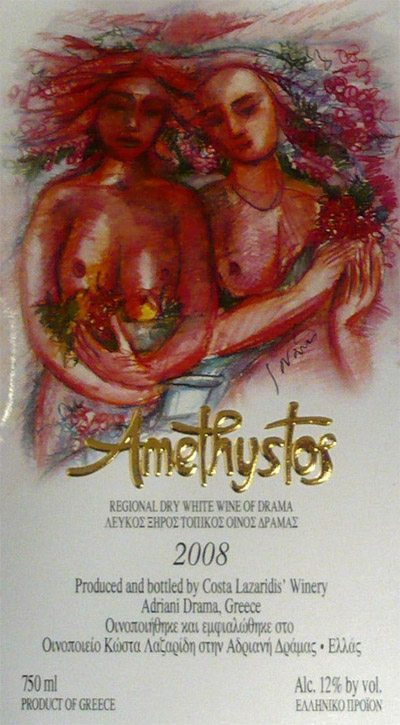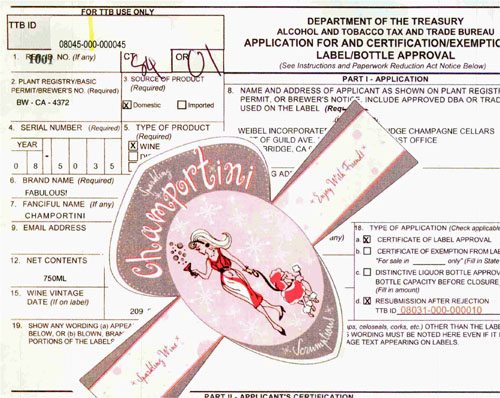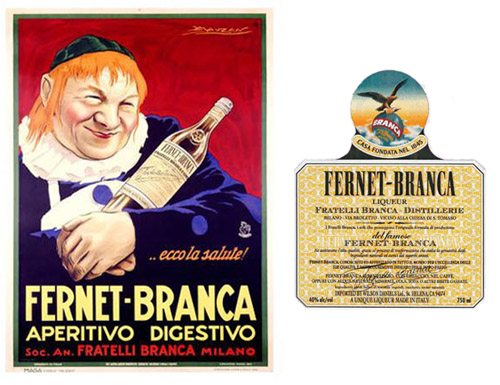This approval shows a tremendous amount of change in eight short years. First of all, it is hard to imagine that the Bureau would ever allow the term “vodka” on a beer label. Somehow I don’t think that would fly in this day and age. Further, the qualification seems to mandate the use of this term, in a particular way. The qualification suggests that the arrangement of the words may lead to controversy, rather than the reference to vodka and a famous vodka brand on a beer label. Pages 12-22 of this document show the controversy. Second, the product is gone. So is the named agency (that is, the label functions have moved from ATF to TTB). So is the person that approved it. Judy was tremendously helpful and probably had many good reasons to approve this label, in a different era. I wouldn’t want to mention the person, but for the fact that the name is right there and the memories are good. This is also a good example of a “use-up.” The approval tends to say the label is not ideal but the agency will allow it to be used for six months only. I believe TTB/ATF has allowed use-ups for many, many decades. It is difficult to imagine other agencies allowing this privilege, such...
Continue Reading Leave a Commentpolicy
Beer made with Vodka

Tags: ingredients, legally interesting/controversial, policy, qualifications, use-ups
Adult Beverages

Here it is, in all its glory, at long last. TTB’s “areola” policy. From time to time, depending on the circumstances, TTB will say these particular body parts are “obscene” or “indecent” and must be covered. Here is a recent example of such a rejection. It says “Please cover the areolas on the woman.” And these, by way of another example, are certainly well covered. The label above is Amethystos dry white wine, from the Drama region of Greece.
Continue Reading Leave a CommentTags: legally interesting/controversial, policy, rejections, risqué, sexual
Champortini

On many labels, it can be difficult to draw the line. For example, it is tough to say whether this PimpnHo label (also by Weibel) goes too far. But then again, it is fairly clear that Champortini went quite a bit too far. It suggests Champagne but does not qualify to be labeled as Champagne. It suggests Port but does not qualify as Port. It sounds a lot like martini, but has none of the traditional martini ingredients. This puts the brand out in some rough waters, without the safe harbor of an approval before the crucial 2006 grandfather date set forth here. Any one of these issues might have been enough to sink this brand, but putting all these issues together, it would be a great surprise if the brand did not sink. It apparently lasted from April 27, 2007 (the date of the first approval) until a little after February 20, 2008 (the date of the third and final approval, as above). There is no trace of this brand’s survival at the Champortini website shown on the label.
Continue Reading Leave a CommentTags: international, legally interesting/controversial, policy
Liquor Sicle

This Liquor Sicle label features a prominent reference to “Liquor.” This has become rare. Where did the term come from, and where did it go? The Online Etymology Dictionary defines “liquor” this way:
early 13c., likur “any matter in a liquid state,” from O.Fr. licour, from L. liquorem (nom. liquor) “liquid, liquidity,” from liquere “be fluid.” Sense of “fermented or distilled drink” (especially wine) first recorded c.1300. To liquor up “get drunk” is from 1845.
It is semi-ironic that this term is being applied to one of the few TTB products that is not intended to be consumed in a “liquid state.” From way back in 1892, here is a court struggling with the term, and trying to find the distinction between beer and liquor. In a further irony, the term is probably used more commonly, these days, on malt beverages (such as Colt 45) compared to distilled spirits. “Malt liquor” goes back to at least 1937, and Alvin Gluek secured a patent on it in 1948.
Continue Reading Leave a CommentTags: container, non-liquid, policy
Remove the Word "Digestif"

Fernet-Branca has been well known around the world as a “digestiv” since about 1845. The above poster shows Fernet-Branca described as a “digestivo.” By contrast, the US label, on the right, bears no reference to this key term. TTB does not allow any reference to digestif, digestiv or similar. Here is an example of a recent rejection, wherein TTB explains that the term is not allowed, and why. TTB regards it as a therapeutic claim. Eric Asimov explains:
Digestives were historically intended as palliatives, meant to counter all sorts of ailments and physical imbalances. They may no longer be assigned quite the same medicinal value today as they were a few hundred years ago, but count me among the many who believe they can help to settle that queasy feeling.
Fernet-Branca is one of the more famous examples of a digestif, but there are others, such as Fernet Stock, Escorial, Becherovka, Averna, bitters, amaro, etc. In general, digestifs are intended to be consumed after a meal, with dessert of coffee. By contrast, aperitifs, such as Aperol and Campari, are most often served before meals.
Continue Reading Leave a CommentProtest Wine

Tensley Wine is not happy with the way things are going in Washington. They claim it took more than a year to get approval on the wine label above. It is no wonder, and it is some credit that our government would approve it at all. Then again, it’s not entirely clear that the label is “approved.” Box 18c shows that it is an exemption from label approval, rather than a box 18a label approval. Either way, I am pretty sure President Obama (among others in Washington) has a thick skin and can deal with it. It is clear that Tensley is annoyed, but it’s less clear what Tensley is annoyed about. There is some griping about the local bureaucracy, and a lot of griping that federal taxes are too high for some people and too low for others. The front label notes that the wine has 1% more alcohol than table wine, but is taxed at a rate 235% higher.
Continue Reading Leave a CommentTags: drinkwire, legally interesting/controversial, policy, political, speech

